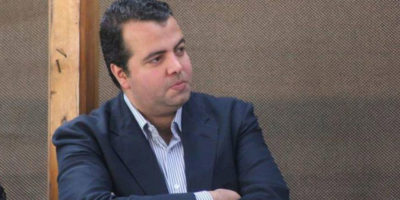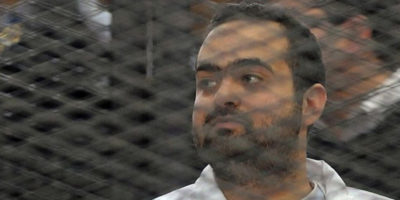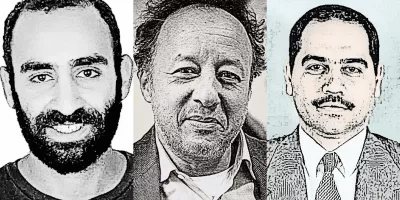Successive waves of arrests against the opposition in Egypt
Geneva, 24 May 2017
A new wave of arbitrary arrests has taken place in Egypt since the beginning of May 2017. So far, dozens of political activists and opponents of Egypt’s regime have been arrested.
The Committee for Justice commented: “No one is safe from the laws in Egypt, which criminalize the freedom of speech, of expression and the right to political opposition.”
According to the investigators of the Committee for Justice, the arrests have so far affected 58 known activists belonging to opposition parties and movements in Egypt. These procedures are a continuation of the ongoing arbitrary arrest campaigns that have not stopped since 2013 until now.
(See monitoring table at the following link)
In Alexandria, security forces raided the homes of four activists on Sunday (May 21st) and arrested Bassem Jaber, who was interrogated about the case No. 7788 of 2017. He was accused of joining a terrorist group that was established contrary to the law, and whose aim is to impede state institutions from performing their role, such as the army, the police and the judiciary, by promoting false rumors and news to provoke public opinion against them and to overthrow the regime. Bassem was also accused of using social media pages on Facebook to promote ideas aimed at obstructing state institutions and overthrowing the regime. He was also accused of distributing publications against the state to incite the people, to commit acts of terrorism. Bassem’s lawyer had known that the Public Prosecution in Alexandria had issued similar decisions to arrest 8 other youths for interrogation in the same case, but their names were not identified.
Al Montaza Awwal prosecutor’s office decided to remand Bassem in custody for 15 days for investigations.
On 17 May, the State Security Prosecutor renewed the detention for four activists in Alexandria for a period of 15 days, including Nael Hasan, Islam Al-Hadari, Shazly Hussein and Ahmed Ibrahim, on charges of insulting the President of the Republic through the Internet, joining an established group contrary to the provisions of the law, engaging with a group aiming to stir up public opinion, obstructing state institutions and overthrowing the regime. Those are charges punishable by the law against terrorism, with penalties amounting to imprisonment for 10 years.
On May 16, 2017, the Public Prosecution of Port Said referred the young man (Ahmed Henefi) to the Misdemeanor Court, just two days after its previous decision to remand him in custody for 4 days for investigations in case No. 2477 of 2017, where the Public Prosecutor’s Office addressed several charges on 13 May 2017;
- Deliberately broadcasting false news, statements and publications on his personal Facebook page, which will disturb public security and harm the public interest as described in the investigations.
- Publishing in bad intent – on his personal Facebook page- News, statements and rumors that would disturb the public peace, cause panic among people and harm the public interest as described in the investigations.
- Insulting the President of the Republic by publishing offensive posts and statements that would harm him, as described in the investigations.
He was referred to an urgent trial before the Misdemeanor Court last Tuesday, 16 May 2017. Tuesday 23 May 2017, the court found him innocent of all charges.
(For more information about his case see the following link).
In Luxor, in Upper Egypt, security forces detained 4 opposition political activists. The last one of them was (Yasser Mohammed Ahmed Taha) aged 27, who was arrested on 21 May, and was forcibly disappeared and has not yet been interrogated
These arrests come at a time when Egypt is entering its third month since the declaration of the state of emergency that gives the security authorities broad powers in arbitrary arrests, closing the public sphere and confiscating rights and freedoms.
The Committee for Justice examined the facts of these arrests and found that they were mainly based on the expression of political opinions criticizing the regime and its economic, social and security policies. The latter have led to an unprecedented deterioration of rights and freedoms, which is reflected by arbitrary arrests and continuous violations of freedom of opinion and expression.
The Committee for Justice has reviewed a statement issued by the Ministry of Interior on May 19 which was published on its official Facebook page. The statement pointed out that the ICT sector has managed to control 40 cases as part of the efforts of all sectors of the Ministry of the Interior, particularly in relation to technology and information.
The Ministry of the Interior claimed, in the statement, that it was able to follow the terrorist elements and that it had arrested five other persons (without giving their names), on charges of publishing provocative posts, and committing acts of sabotage against both the Institutions and citizens, on social media sites.
The Committee for Justice stresses that there is no legal basis for any arrest based on a clear violation to the freedom of opinion and expression, and that the use of broad terms and laws to suppress dissent is a completely arbitrary method.
Although the international law did not provide a clear and specific definition to the arbitrary detention, the Working Group on Arbitrary Detention of the United Nations has defined the arbitrary detention as “A detention that is carried out on the contrary to the human rights provisions of the major written human rights documents”
The Working Group considers that the deprivation of liberty violating the exercise of the rights or freedoms guaranteed by articles 7, 13, 14, 18, 19, 20 and 21 of the Universal Declaration of Human Rights and by articles 12,18, 19, 21, 22, 25, 26 and 27 of the International Covenant on Civil and Political Rights, constitutes an arbitrary detention.
The United Nations Commission on Human Rights, represented by the International Panel of Experts explaining the International Covenant on Civil and Political Rights, believes that all public figures are a legitimate target of public criticism, and that criticism of public institutions should not be prohibited, that libel should be treated as a civil, not criminal matter, and should never be punished with imprisonment.
The Committee for Justice stressed that “in cases of public debate concerning public figures in the political sphere and public institutions, the Covenant sees an exceptional importance to ensuring unrestricted expression and the mere fact that expressions are offensive to the public character is not sufficient to justify sanctions.”
In addition, all public figures, including those exercising the highest political powers, such as heads of State and Government, are legitimately subject to criticism and political opposition.





